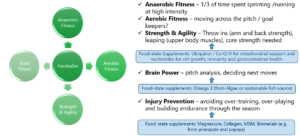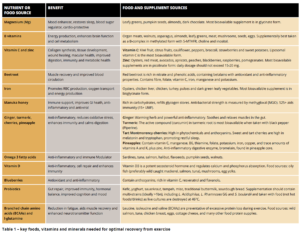What is a goal? In the game of football, it’s when a player scores i.e. we often focus on the end result. At the same time, the physical goal scored brings with it, much preparation, anticipation and in those 90 mins, we are all on the edge of our seats wondering who will score? how many goals will be scored? and when they will happen i.e. our cognitive ability focuses on inputs to an outcome without even realising. We have the amazing ability to process all of that information and simplify this immense focus on the outcome; being the goal scored.
Optimal Football Nutrition, itself is a goal that we work towards. Preparation of timing for when a player eats, analysis of nutritional content and what a player eats, knowledge of what is good or bad for an individual’s dietary needs are all factors to be taken into close consideration when deciding what the optimal plate looks like for a player, depending on his training and match day goals, and what will make him thrive physically and mentally.
As a Nutritionist, I recognise that nutrition itself doesn’t just require mastery of food, it requires understanding what makes a footballer tick, delving into all the bodily systems such as the liver, endocrine and neurological pathways and ensuring that a player understands how his or her body functions is the end stage towards optimal health through a tailored plan of food, hydration, sleep and managing stress loads.
What are the Key Ingredients for a Footballer?
Football brings physical demands for aerobic and anaerobic fitness, along with physical and mental strength. Injury is rife in the sport. So a player needs to know how to optimise the energy supply into the body, which reaches the mitochondria (heart of the cell); to provide energy. The International Sports Science Association (ISSA) describes mitochondria as the ‘powerhouses of cells’. Mitochondria produce 32 ATP molecules with just one cycle of reactions. The more oxygen getting to muscle cells and the more quickly this happens, the faster and more efficiently the mitochondria can produce energy.
Players can maximise mitochondria biogenesis and oxygen flow to muscles and mitochondria, by adequate hydration, quality sleep and purely focusing on optimal timing of when they eat.
Massage also helps increase the volume of mitochondria within skeletal muscle and thereby helping cells to recovery after intense training. Food state supplements such as co-enzyme Q10 (Ubiquinol) are a great addition to footballer’s eating regime to help increase energy levels and also avoid gastrointestinal imbalances on and off the pitch.
Nutrients such as Magnesium from leafy green vegetables, legumes, nuts and seeds and Bromelain from pineapple can contribute towards reduced likelihood of injury, through reducing inflammation in the body.

Meal Planning & Hydration
Meal planning should start from grass roots of when a child enters the game of football, to achieve the best pathway to success in adulthood. Parents should be encouraged to involve children in cooking and choosing ingredients from a young age, so they can learn about food and nutrition and be encouraged to try new foods. A useful tip on portion sizes: palm-sized amount of protein, a fist-sized amount of vegetables, a cupped hand of carbs, and a thumb-sized amount of fats.
Hydration is essential for footballers and for performance, being important for kidneys, liver and metabolism. Body fluids impact digestion, transport nutrients to cells and rid the body of toxins. Not drinking enough water therefore negatively impacts temperature regulation, blood pressure and heart rate, and electrolyte status.
A simple way to calculate daily water intake is to follow this equation: 35 ml of water per kilogram of body weight. E.g. a child weighing 40 kg should aim to drink about 1.4 litres of water daily. During training and matches, they should drink water before, during (about 250 ml every 20 minutes), and after to replace lost fluids.
There are many sports drinks available to enhance recovery post-exercise by replenishing glucose and minerals, but unless engaging in long training sessions, plenty of dietary fluid intake and a healthy snack should be sufficient. A homemade alternative is beetroot juice with a pinch of salt to replenish carbohydrates and sodium.
Dehydration affects a footballer’s health by causing cardiovascular stress, raising body temperature and impairing sports performance. Training duration, environmental temperature and humidity, body size and fitness levels are all factors that affect an individual’s sweating response – the fluid lost during exercise can be up to 2 litres per hour. It is advised to drink during exercise, especially during prolonged high-intensity training, but not to overdrink. Ideally, a person can weigh themselves before and after training to check how much fluid is lost while exercising. A weight loss of 1 kg represents a fluid loss of 1 litre.
What are the Key Nutrients Needed for Recovery?
Table 1, summarises key foods, vitamins and minerals I believe are needed for optimal recovery post training and match days:

Food is simply a vehicle for nutrients to get into our body and provide building blocks and energy for all the body’s structures and functions. An optimal diet supplies adequate nutrient quantities for tissue maintenance, repair and growth, and preserves liver function.
For recovery, key questions to ask are: are we hydrating adequately, eating adequate macro and micronutrients, taking time for rest and recovery, and getting enough sleep? Recovery is not only about the two-hour window post-training or after a match.
Replenishment for recovery should be integrated throughout each and every day of a footballer’s journey. Finally, parents, children and players are encouraged to listen to the body. If you find your body responds well to some things, and less to others, make sure you carry this forward into your recovery strategy.

